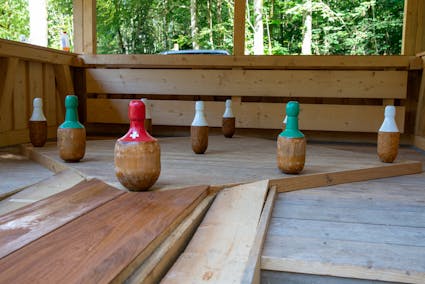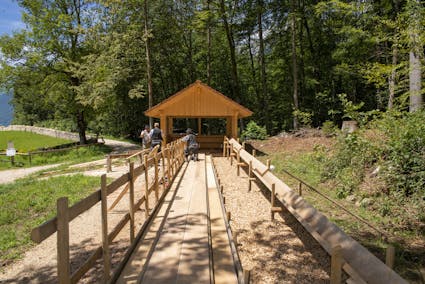152 – The Neuchâtel skittle alley «Jeu de quilles neuchâtelois», 19th century (Reconstruction)
The Neuchâtel skittle alley, which has been reconstructed at the Swiss Open-Air Museum, has its roots in the Jura mountain range. Traditional skittles was a popular pastime throughout Switzerland, reaching its peak in the 19th century. Since then, it has increasingly been replaced by pétanque (also known as “boules”) and bowling. Despite this, the game lives on and is still played in the Jura region, usually near pubs and farms. The type of skittles, the lanes and the rules differ from region to region, making the Neuchâtel version particularly special.

How to play
As with all forms of the game, the aim of Neuchâtel skittles is to knock down all nine skittles with a wooden ball, which is rolled down a lane made of two planks placed end to end. Before play begins, a skittle frame is used to arrange the skittles as shown. The aim of the game is to hit as many of the skittles as possible with the wooden ball, thrown without a run-up, and knock them down. One point is awarded for each pin knocked down; however, points are only awarded if the front pin, i.e. the one closest to the player, is also knocked down. The game can be played in groups or individually. It’s the job of any players not currently throwing to roll the balls back.

Reconstruction
By reconstructing the skittle alley, the Swiss Open-Air Museum is helping to preserve Neuchâtel skittles’ enduring tradition.
A special feature of a Neuchâtel skittle alley is how it’s built – it consists of two planks that are joined together and raised lengthwise. The surface is specially sanded and each alley is finished differently.
The skittle alley was built in collaboration with the “Association intercantonale des joueurs de boules Grand jeu neuchâtelois”, an organisation dedicated to preserving this traditional game.
The project was financially supported by the Swiss Federal Office of Culture and the “Amis Romands du Ballenberg”.

Ballenberg
Swiss Open-Air Museum
Museumsstrasse 100
CH-3858 Hofstetten bei Brienz
Opening hours Administration
3 November 2025 to 8 April 2026
From Monday to Friday
8.30 am to 11.30 am
1.30 pm to 4.30 pm
Opening hours
9 April to 1 November 2026
10 am to 5 pm daily